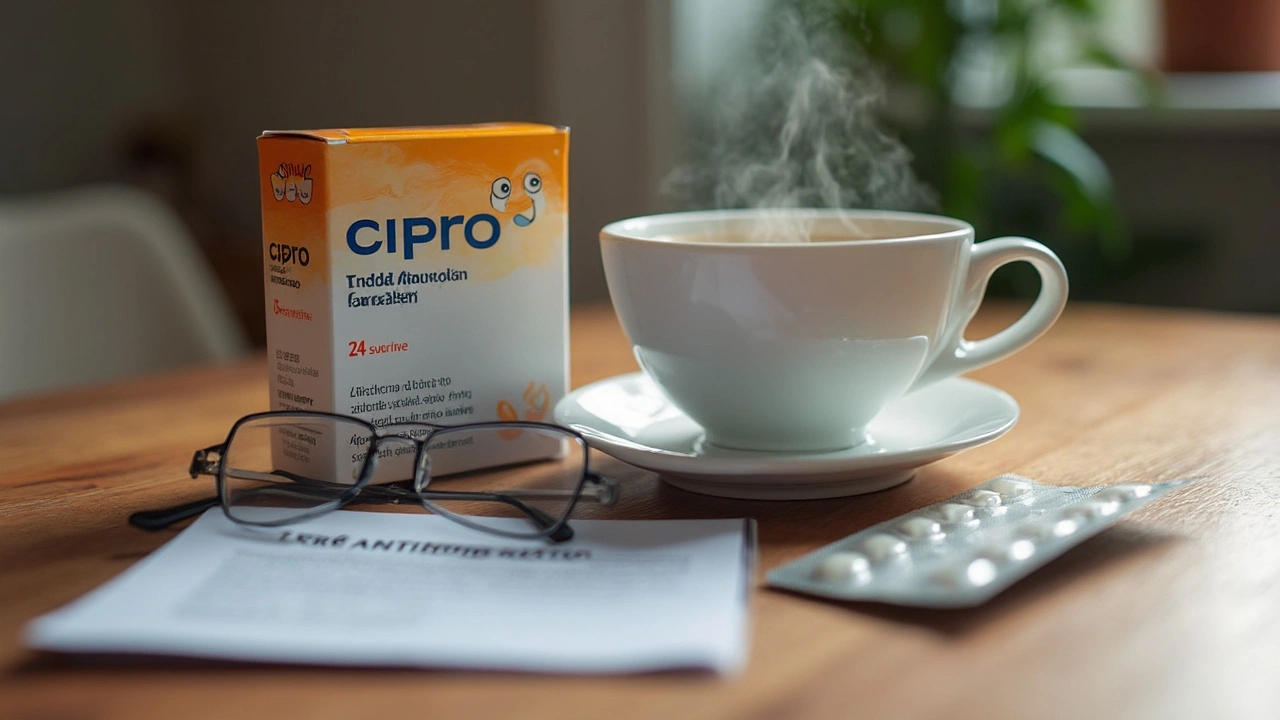Cipro: Side Effects, Uses, and Safety Tips for Antibiotic Treatment

Cipro tends to show up when things get pretty intense—think raging bladder infection, stubborn sinus infection, or even when someone brings home a mystery bug from their summer travels. It’s not your everyday, run-of-the-mill medicine. Cipro—short for ciprofloxacin—works as one of the big hitters in fighting off some truly nasty bacterial infections. You might be surprised at just how useful and, frankly, controversial this little pill has become. People love the easy relief it can bring, but the warnings on that pharmacy printout? They’re not for nothing. Let’s get real about what Cipro does, how to handle it, and why you need to know exactly what you’re signing up for if your doctor hands you a script.
How Cipro Works: The Science and Real-World Uses
Most folks don’t realize that Cipro belongs in a group called fluoroquinolones. These antibiotics are like the SWAT team: you call them in when the usual suspects—like penicillin or amoxicillin—don’t do the job. Cipro works by slamming the brakes on bacteria’s DNA repair system, basically making it impossible for those tiny invaders to reproduce. That makes it wonderfully effective against bacteria that other drugs can’t touch. If you’ve ever been hit with a severe UTI (urinary tract infection), traveler’s diarrhea after a questionable street taco, or a gnarly skin infection, there’s a good chance your doctor has considered Cipro.
Doctors don’t hand out Cipro for fun. You’ll notice they reserve it for more serious cases, and there’s a reason: resistance. When Cipro gets overused or misused, bacteria can evolve to dodge its effects, making future infections way harder to treat. And—fun fact, or not so fun if you find yourself in this boat—some bacteria, like a few strains of E. coli, have already started to grow resistant, especially after years of heavy use. That’s why you might hear docs telling you: don’t beg for Cipro unless you absolutely need it.
There’s another layer: what infections Cipro is actually approved for. The FDA backs it for treating everything from bone and joint infections to complicated lung issues like pneumonia caused by certain bacteria. It’s even stockpiled for emergencies like anthrax exposure, which is kind of wild when you think about it. Here’s a quick look at where Cipro tends to shine:
- Complicated urinary tract infections (really stubborn or spreading ones)
- Serious respiratory tract infections
- Gastrointestinal infections (including typhoid fever and traveler’s diarrhea)
- Bone and joint infections
- Some skin and soft tissue infections
- Prevention or treatment of anthrax after exposure
Still, it’s not a ‘cure-all’—and it’s not for everyone. The Centers for Disease Control and Prevention (CDC) recommends doctors skip Cipro for simple infections and look for safer or more targeted alternatives when possible. Pregnant women, kids (because it might affect developing joints), and folks with certain health issues often get steered away from it.
| Condition | Cipro Used? | Alternatives |
|---|---|---|
| Uncomplicated UTI (adult) | Sometimes | Trimethoprim/Sulfamethoxazole, Nitrofurantoin |
| Complicated UTI | Yes | Other fluoroquinolones, Carbapenems |
| Sinusitis | Rarely | Amoxicillin, Doxycycline |
| Anthrax Exposure | Yes | Doxycycline |
If you’re wondering what a typical dose looks like, it’s usually 250–750 mg, twice a day, for 3–14 days, depending on the infection. Always finish the prescription—stopping too early is like letting the bad guys regroup.

Side Effects and Warnings: What Pharmacies Won’t Always Tell You
This is where things get interesting, because Cipro can pack a punch—and not just against bacteria. The most common side effects? Think upset stomach, nausea, or a headache that won’t quit. But Cipro has some unique and more serious reputation-makers that you won’t see with every antibiotic. Ever heard of tendon rupture as a side effect? With Cipro, it’s a real thing—especially for people over 60, those on steroid meds, or anyone who keeps up with high-intensity exercise, like runners. Here’s the story: Cipro can weaken the tendons, especially your Achilles, enough that they snap, and if you ignore that first weird twinge of pain, you might end up in a walking boot for six weeks or more.
It doesn’t end there. Rarely, Cipro messes with your nerves or even your mood. Some people, often within the first few doses, get tingling, numbness, spells of confusion, or even hallucinations. Doctors call this peripheral neuropathy, and while most people bounce back once they stop the drug, not everyone does. That’s why it lands in the serious warning box—on the bottle and in TV lawyer ads.
Another thing to watch: Cipro and sunlight do not play nice. One afternoon outside and you could walk away with a sunburn worse than Texas in July. The fancy word is "photosensitivity," but the advice is simple: slap on sunscreen with a seriously high SPF, and maybe skip the poolside lounging if you’re mid-treatment.
And here’s something not everyone expects—Cipro changes how your body handles sugar. Diabetics need to check their blood sugar more than usual because this antibiotic can throw numbers out of whack, sometimes leading to shaky lows or bursts of hyperglycemia.
There are other, less common (but no less real) risks that have landed Cipro and its relatives in the news. These include aortic aneurysm (a dangerous bulging of the heart’s biggest artery) in rare cases, and a higher risk if you already have blood vessel problems or are older. The FDA actually tacked on a warning in 2018 after seeing the numbers tick up in people using fluoroquinolones.
So, how can you stay safe if you need Cipro? Here’s a quick rundown of tips that everyone should keep in their back pocket:
- If you start getting pain or swelling in your joints, especially in your lower legs, quit Cipro immediately and call your doc.
- Stay out of the sun as much as possible or protect your skin with SPF 50+ sunscreen, hats, and long sleeves.
- If you have diabetes, check your blood sugar more often while you’re on the drug.
- If you feel dizzy, out of sorts, or develop numbness or tingling, tell your healthcare provider right away.
- Take Cipro two hours before or after anything rich in calcium, iron, magnesium, or zinc (including milk or multivitamins)—they block your body from absorbing the medicine.
Keep in mind that drinking a ton of water is a must. Cipro can make you more prone to kidney stones, so stay ahead with extra fluids, especially if it’s summer in Austin and you’re sweating buckets anyway.
| Side Effect | How Common? | Additional Notes |
|---|---|---|
| Nausea/Diarrhea | Very common | Usually mild, clears up after treatment |
| Tendon pain or rupture | Rare | Increased risk in older adults and those on steroids |
| Photosensitivity | Uncommon | Sunburn can happen even on cloudy days |
| Peripheral Neuropathy | Rare | Can be permanent in rare cases |
If you have heart rhythm problems, Cipro can lengthen your QT interval (this shows up on an EKG), which might lead to a dangerous arrhythmia. If you’re on other meds that raise the risk—like certain antifungals or antiarrhythmics—say so before you start the course.

Tips for Smart Use: Getting the Most Out of Your Cipro Prescription
It’s easy to grab your Cipro prescription and blow right past the fine print or pharmacy handout. But small choices on how you take it can mean the difference between speedy relief and a ton of regret. Forget myths about antibiotics—yes, you always need to finish the course, no matter how fast you start feeling better. Stopping early gives those surviving bacteria a shot at rebounding, and then you might be dealing with something tougher and even trickier next time around.
Take Cipro with a big glass of water, but skip your morning OJ, lattes, antacids, and multivitamins for at least two hours on either side. Calcium and a few other minerals “trap” the drug, so less of it gets into your blood. Think about it like this: you want that Cipro showing up at the battle, not benched by your breakfast.
If you’re taking blood thinners like warfarin, have your levels checked more often. Cipro can bump up your risk of bleeding, even if you’ve been stable for ages. Same goes for diabetes meds—watch for low sugars, especially if you’re suddenly eating less because you feel queasy from the infection.
Wondering what to do if you miss a dose? Take it as soon as you remember, but don’t double up to make up for it. Spacing matters, and too much Cipro at once can push the side effects over the edge.
A few more tips from people who’ve learned the hard way:
- Write down any strange reactions and bring them up with your doctor—even if you think they’re unrelated.
- Don’t drive or use heavy machinery if you feel foggy—Cipro can occasionally muddle your brain or reaction time.
- Avoid alcohol or at least cut back—if your liver’s already working overtime clearing out Cipro, adding wine or beer doesn’t help.
- Store the tablets away from heat and humidity. That means not in your car, not in the bathroom, and certainly not in direct sun by a window.
- Once you’re finished, get rid of extra pills safely—don’t hand them off to friends or keep them “just in case.” Bacteria change over time, and what works now may not be right six months from now.
Would it shock you to hear that about 30 million Cipro prescriptions go out in the U.S. every year? That’s a huge number considering the side effect profile and resistance risks. But if your infection really is serious, and other antibiotics just won’t cut it, Cipro still plays a starring role. The trick is to use it with eyes wide open, follow the smart tips, and team up with your doctor on any questions or weird symptoms.
Cipro isn’t something to be afraid of, but it definitely deserves respect. Used right by someone who understands its quirks, it’s a lifesaver. But take a shortcut, skip a dose, or ignore those side effect warnings, and you could end up wishing you’d read the fine print. Think of it as a powerful tool with a non-negotiable manual. It’s not the old antibiotics you remember—it’s a modern weapon. And in this fight against superbugs, the way you use it could make all the difference for you and for everybody else too.

11 Comments
Reading through this post, I'm reminded of the complexity behind antibiotics like Cipro. It’s not just about taking a pill and expecting a cure; understanding the pharmacodynamics and potential side effects can really influence how one perceives the treatment. The article’s tone balances technicality with accessibility, which is quite refreshing.
One thing that intrigues me is the risk-benefit calculus that medical professionals must weigh when prescribing such drugs. Cipro, being potent, has its place but also demands careful usage to avoid resistance and adverse reactions.
Questions come to mind about how global practices vary in administering fluoroquinolones and what procedural safeguards exist against misuse. It’d be fascinating to see comparative data on side effect rates from different populations.
Overall, this post opens up a window into the layered nature of antibiotic treatment — not just efficacy but also patient safety, which is paramount. What are everyone else’s thoughts on the stewardship of these powerful medicines?
Ughhh seriously people overhype these antibiotics way too much. Like yeah Cipro works but have you read the fine print on side effects? So many ppl just swallow pills without thinking about the repercussions. Lazy much?
I'm tired of ppl whining about side effects when doctors don't explain anything properly or patients self-diagnose like they’re experts. Cipro isn’t some magic cure-all. It’s a heavy hitter and should be used smartly, not sprayed around like candy.
Frankly this whole antibiotic drama is blown outta proportion by media and the internet. If you follow directions and don't mess with dosages, it generally does the job. Otherwise, don’t complain after the fact.
And btw, that "surprising details" line is probably just fearmongering to get clicks. Just my take.
This guide is definitely a much-needed breath of fresh air for those facing antibiotic prescriptions, especially Cipro. I love how it not only details the uses but also emphasizes the importance of safety tips — because in my experience, patients often feel overwhelmed and uninformed.
Knowing about potential side effects beforehand helps reduce anxiety and promotes adherence to the regimen. Plus, it empowers us to be advocates for our own health, asking questions and seeking clarification from doctors.
Seriously, if more resources were as clear and relatable as this, I think we'd see better health outcomes and fewer complications
What’s everyone’s experience been with Cipro? Has anyone had significant side effects or found tips that helped them cope better?
Side effects... ugh, those always freak me out. I've had pills that mess with my stomach like crazy, so I’m wary of anything labeled 'powerful antibiotic.' This article makes me feel a bit safer knowing what to expect but still, the unknown is scary.
I wonder if there are particular risks for people with allergies or other illnesses? Because, honestly, side effects can sometimes be worse than the illness itself.
Reading about safety tips is good but do doctors really take the time to go over all that? Sometimes I feel rushed at appointments and just nod along.
While the article does a decent job, I can't help but notice some important omissions. For a drug as significant as Cipro, addressing the growing issue of antibiotic resistance more thoroughly would have been prudent.
Moreover, the piece lightly glosses over the neurological side effects that have been documented, which can sometimes be severe. Readers deserve to be fully informed, not just spoonfed reassuring platitudes.
It might also be valuable to delve into contraindications with other medications; lots of patients juggle multiple prescriptions, and these interactions can be critical.
Overall, informative but could be more comprehensive and less fluffy.
Honestly, the effectiveness of Cipro is undeniable, but I can't stand when articles ignore the importance of dosing precision and patient selection criteria. From a pharmacological standpoint, misuse of such broad-spectrum antibiotics fuels resistance patterns that threaten public health.
Pharmaceutical regulations in some regions are lax, and that sloppy oversight jeopardizes patient outcomes. Let’s not romanticize antibiotics; their use should be restricted and thoroughly monitored.
The article’s generalized safety tips are useful but don’t replace the necessity of specialized knowledge in administration.
We need stricter protocols, not just advice posts.
Feeling pumped that this article took the time to highlight both the benefits and pitfalls of Cipro. It’s easy to get caught up in the "miracle drug" mindset, but the side effects are real and deserve respect.
Anyone here who’s had to use Cipro during a tough infection knows what I mean. Being mindful about following guidelines, staying hydrated, and reporting symptoms early can make all the difference.
Health is a marathon, not a sprint — so knowing what we’re dealing with helps keep us in the race.
Keep the info coming!
Just wanted to chime in with a nudge towards empowerment—learning about meds like Cipro is crucial. I’ve coached many folks to be assertive with their health providers, asking questions and pushing for clarity on side effects and alternatives.
This article is a fantastic start but don’t stop here. Take notes, share your concerns, and if needed, seek a second opinion. Your body, your rules.
Remember, safeguarding your health starts with knowledge and confidence.
Anyone else had a scenario where being well-informed changed the course of their treatment?
Seriously, how can we rely on articles like this without critical evaluation? There’s so much misinformation floating around antibiotics, it’s maddening. Cipro, like any drug, has detailed pharmacokinetics and clinical nuances that deserve precise articulation.
For instance, the dosing adjustments in renal impairment, or the risk factors for tendinopathy, are not trivial and should be emphasized more rigorously.
Moreover, the casual tone sometimes dilutes the gravity of potential adverse reactions, leading to complacency.
Patients must demand better, and so must authors. Accuracy > fluff.
The article’s insights are solid, but I’m concerned about national overuse. In the US, fluoroquinolone prescriptions have skyrocketed despite warnings. This trend threatens the efficacy of vital drugs like Cipro for real emergencies.
The health system needs to incentivize judicious prescribing and enhance patient education campaigns. Otherwise, we’re headed toward an antibiotic crisis.
Multifaceted action from policymakers, physicians, and patients is mandatory.
Are we not ignoring another aspect? The pharmaceutical giants pushing Cipro have vested interests that may not always align with public health. Sometimes, warnings get delayed or underplayed to maximize profits. Doesn’t anyone else find this suspicious?
The article is good but blind trust in prescribed medicines without questioning motives can lead to blind spots.
I’ve seen friends suffer serious side effects that seemed conveniently dismissed by doctors eager to prescribe the same drug repeatedly.
We should always dig deeper beyond surface-level information.